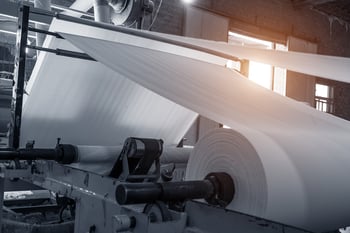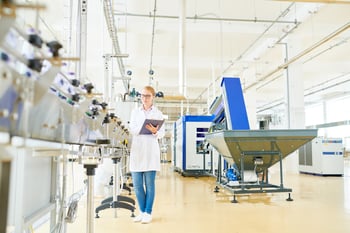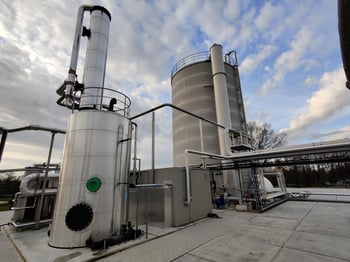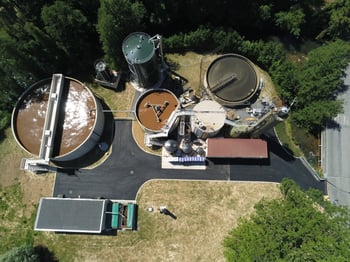More and more industrial companies are opting for methanization as the biological treatment of choice for their liquid effluents. As their project develops, expert advice can be invaluable for optimizing the performance of their methanization plant, and more generally, their wastewater treatment plant.
The performance of methanization technology has improved continually and consistently ever since its first appearance on industrial sites some twenty years ago. Today, it is one of the most efficient ways of treating the liquid organic effluents produced by industrial processes (as part of what is now referred to as ‘industrial decarbonization’). It generates energy on site, reducing total plant energy bills. It also produces less residual sludge than a conventional wastewater treatment plant
Expert advice from a specialist like Econvert can be very useful when industrial companies want to ensure optimal operation of a methanization installation and a high quality of discharge treatment. Econvert is a Saur Group Industrial Water Solutions company. Its core business is building anaerobic granular sludge methanization systems that deliver an industrial-scale solution for effluent treatment. Saur Industrie France supports its customers with end-to-end project integration and management.
Methanization in papermaking

Examples of projects successfully delivered by the partners include the one for Groupe Rossmann paper and board making subsidiary SICAL. The analysis results of discharges from the wastewater treatment plant operated by this paper mill in northern France had been less than satisfactory for some time.
In 2017, the company decided to use the opportunity presented by an increase in its production capacity - and therefore process effluents - to examine the option of incorporating a methanization step.
There were three main reasons behind this decision:
- to improve discharge quality
- to increase treatment capacity within the limited space available at the site
- to use the biogas recovered from the process to fuel a boiler
The extensive papermaking industry experience of Econvert led it to recommend an EGSB anaerobic digester 7 meters in diameter and 11 meters high. In service since the beginning of 2020, the system enables the SICAL plant to treat 8,500 kg of organic pollution (COD) per day to a quality that fully meets the expectations of the company. Ultimately, this site will have the capability of producing up to 3,000 m3 of biogas every day. Paper mill effluent leaving the reactor still passes through a conventional aerobic treatment before being discharged into a river near the site.
Methanization in the food industry

The food industry is another sector that can benefit from the methanization process to treat its liquid industrial effluents. Econvert's extensive experience in this industry gives it the confidence to promise organic pollution reductions of between 70% and 80% to potato processors. The initial investment is certainly significant, but the subsequent energy consumption and operating costs are considerably lower than those associated with conventional biological treatment processes. The ability to produce biogas also adds weight to the business case.

For Dutch French fries producer Aviko Rixona, Econvert proposed an industrial-scale turnkey solution for treating effluent from its processing plant.
The 9-meter diameter, 14-meter high EGSB methanization unit now installed here can eliminate up to 18,000 kg of COD per day. At the same time, it produces between 4,300 and 6,000 m3 of biogas every hour. The biogas is then reused on site after purification. This anaerobic treatment solution has also halved the plant electricity bill and reduced biomass production by 75%.
Methanization solutions for all applications

But methanization is a solution whose applications extend beyond major industrial facilities. It can also be suitable for very small sites, as long as the methane-generating capacity of the effluents is shown to be sufficient.
The expertise available at Saur Industrial Water Solutions can help you find precisely the right combination of efficient processes and effective installations. Econvert also offers on-site industrial effluent treatment solutions for rental to provide an effective response to a one-off spike in pollution control needs, for example, or perhaps a seasonal requirement for industries such as wine production.
There is therefore a bespoke methanization solution for every industrial company.
To find out more and take the next step, download our illustrated guide to methanization!
![[Illustrated guide] Using methanization to treat your effluents and generate energy - A guide](https://no-cache.hubspot.com/cta/default/7160320/edf1079b-0646-43e2-a7e7-18d056620526.png)




![[Illustrated guide] Using methanization to treat your effluents and generate energy - A guide](https://no-cache.hubspot.com/cta/default/7160320/edf1079b-0646-43e2-a7e7-18d056620526.png)